Sustainable and Responsible Tourism Report - Module Name
VerifiedAdded on 2023/01/11
|14
|4094
|67
Report
AI Summary
This report delves into the realm of sustainable and responsible tourism, exploring its evolution, the role of organizations like the UNWTO, and the principles of tourism planning and development. It examines the multifaceted impacts of tourism from economic, social, cultural, and environmental perspectives, providing a comprehensive overview of the industry. The report discusses the purpose of tourism planning and development to minimize adverse effects. Moreover, it covers the process of tourism development and planning, addressing associated challenges. The analysis includes the implementation of sustainability principles by specific destinations to meet stakeholder expectations and the development and management of sustainability in various tourist destinations worldwide. The report highlights the need for responsible practices to ensure the long-term viability of the tourism sector and its positive contributions to host communities and the environment. It emphasizes the importance of planning and development to ensure that tourism activities have the least negative and adverse impact on the environment.

Report
Paraphrase This Document
Need a fresh take? Get an instant paraphrase of this document with our AI Paraphraser
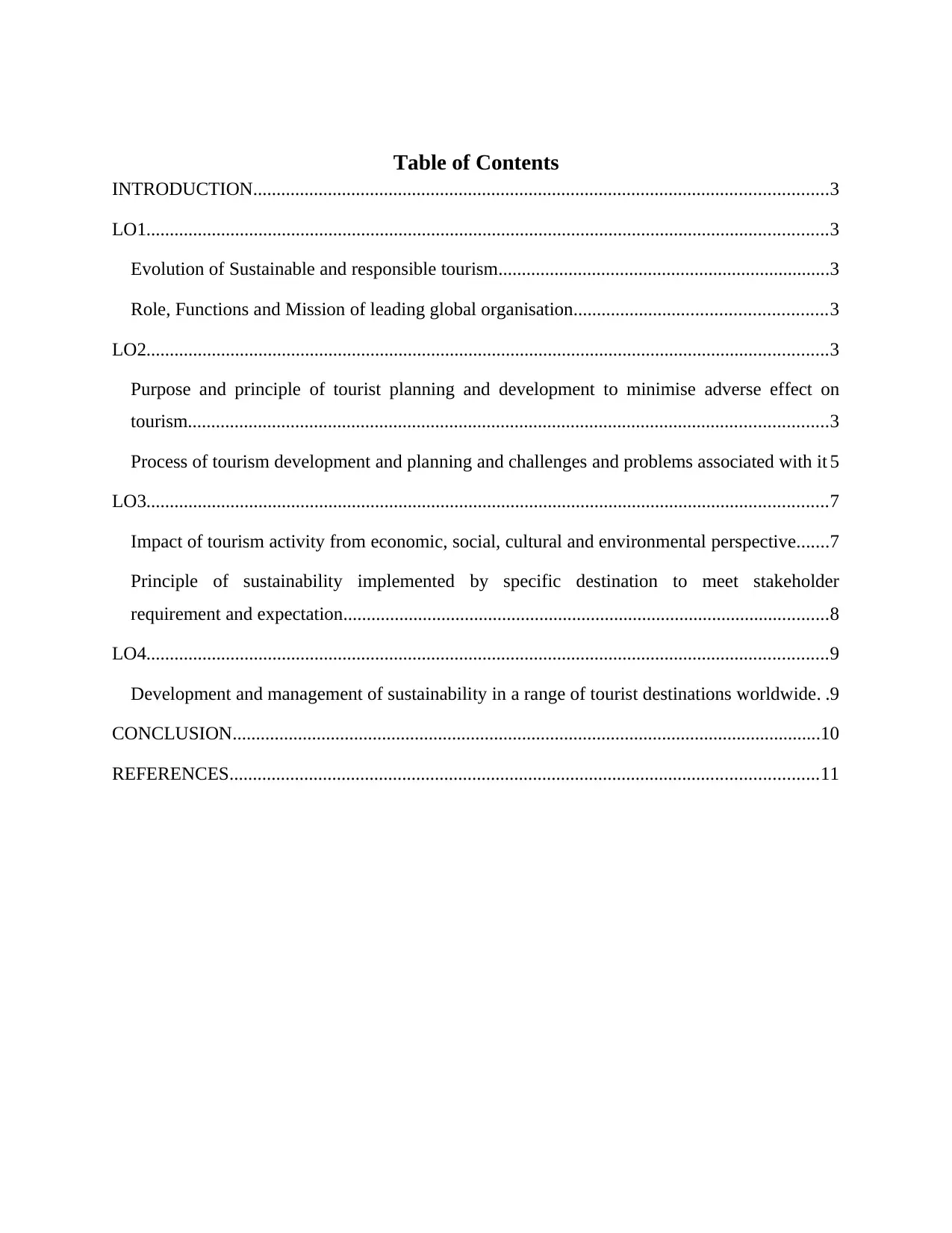
Table of Contents
INTRODUCTION...........................................................................................................................3
LO1..................................................................................................................................................3
Evolution of Sustainable and responsible tourism.......................................................................3
Role, Functions and Mission of leading global organisation......................................................3
LO2..................................................................................................................................................3
Purpose and principle of tourist planning and development to minimise adverse effect on
tourism.........................................................................................................................................3
Process of tourism development and planning and challenges and problems associated with it 5
LO3..................................................................................................................................................7
Impact of tourism activity from economic, social, cultural and environmental perspective.......7
Principle of sustainability implemented by specific destination to meet stakeholder
requirement and expectation........................................................................................................8
LO4..................................................................................................................................................9
Development and management of sustainability in a range of tourist destinations worldwide. .9
CONCLUSION..............................................................................................................................10
REFERENCES..............................................................................................................................11
INTRODUCTION...........................................................................................................................3
LO1..................................................................................................................................................3
Evolution of Sustainable and responsible tourism.......................................................................3
Role, Functions and Mission of leading global organisation......................................................3
LO2..................................................................................................................................................3
Purpose and principle of tourist planning and development to minimise adverse effect on
tourism.........................................................................................................................................3
Process of tourism development and planning and challenges and problems associated with it 5
LO3..................................................................................................................................................7
Impact of tourism activity from economic, social, cultural and environmental perspective.......7
Principle of sustainability implemented by specific destination to meet stakeholder
requirement and expectation........................................................................................................8
LO4..................................................................................................................................................9
Development and management of sustainability in a range of tourist destinations worldwide. .9
CONCLUSION..............................................................................................................................10
REFERENCES..............................................................................................................................11
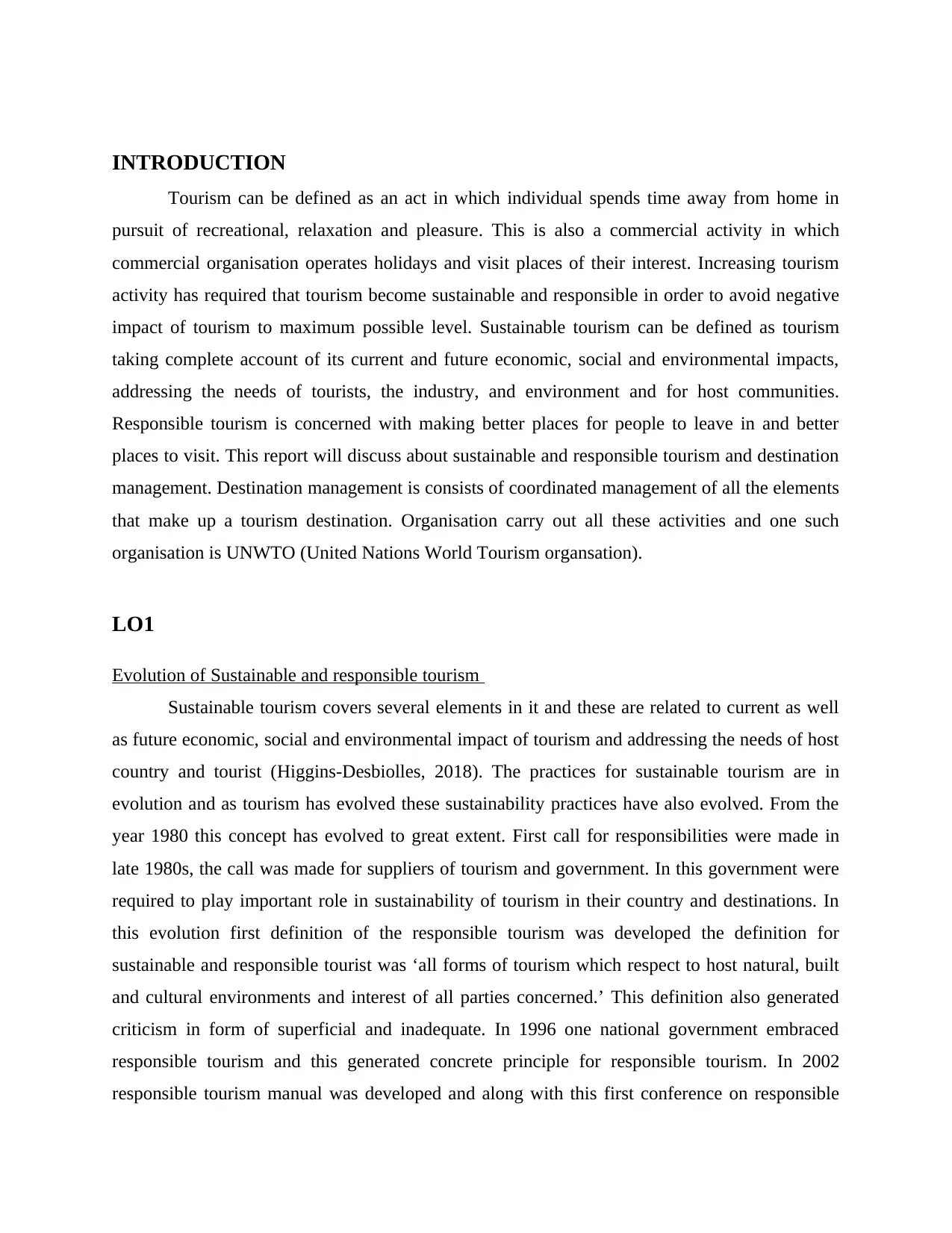
INTRODUCTION
Tourism can be defined as an act in which individual spends time away from home in
pursuit of recreational, relaxation and pleasure. This is also a commercial activity in which
commercial organisation operates holidays and visit places of their interest. Increasing tourism
activity has required that tourism become sustainable and responsible in order to avoid negative
impact of tourism to maximum possible level. Sustainable tourism can be defined as tourism
taking complete account of its current and future economic, social and environmental impacts,
addressing the needs of tourists, the industry, and environment and for host communities.
Responsible tourism is concerned with making better places for people to leave in and better
places to visit. This report will discuss about sustainable and responsible tourism and destination
management. Destination management is consists of coordinated management of all the elements
that make up a tourism destination. Organisation carry out all these activities and one such
organisation is UNWTO (United Nations World Tourism organsation).
LO1
Evolution of Sustainable and responsible tourism
Sustainable tourism covers several elements in it and these are related to current as well
as future economic, social and environmental impact of tourism and addressing the needs of host
country and tourist (Higgins-Desbiolles, 2018). The practices for sustainable tourism are in
evolution and as tourism has evolved these sustainability practices have also evolved. From the
year 1980 this concept has evolved to great extent. First call for responsibilities were made in
late 1980s, the call was made for suppliers of tourism and government. In this government were
required to play important role in sustainability of tourism in their country and destinations. In
this evolution first definition of the responsible tourism was developed the definition for
sustainable and responsible tourist was ‘all forms of tourism which respect to host natural, built
and cultural environments and interest of all parties concerned.’ This definition also generated
criticism in form of superficial and inadequate. In 1996 one national government embraced
responsible tourism and this generated concrete principle for responsible tourism. In 2002
responsible tourism manual was developed and along with this first conference on responsible
Tourism can be defined as an act in which individual spends time away from home in
pursuit of recreational, relaxation and pleasure. This is also a commercial activity in which
commercial organisation operates holidays and visit places of their interest. Increasing tourism
activity has required that tourism become sustainable and responsible in order to avoid negative
impact of tourism to maximum possible level. Sustainable tourism can be defined as tourism
taking complete account of its current and future economic, social and environmental impacts,
addressing the needs of tourists, the industry, and environment and for host communities.
Responsible tourism is concerned with making better places for people to leave in and better
places to visit. This report will discuss about sustainable and responsible tourism and destination
management. Destination management is consists of coordinated management of all the elements
that make up a tourism destination. Organisation carry out all these activities and one such
organisation is UNWTO (United Nations World Tourism organsation).
LO1
Evolution of Sustainable and responsible tourism
Sustainable tourism covers several elements in it and these are related to current as well
as future economic, social and environmental impact of tourism and addressing the needs of host
country and tourist (Higgins-Desbiolles, 2018). The practices for sustainable tourism are in
evolution and as tourism has evolved these sustainability practices have also evolved. From the
year 1980 this concept has evolved to great extent. First call for responsibilities were made in
late 1980s, the call was made for suppliers of tourism and government. In this government were
required to play important role in sustainability of tourism in their country and destinations. In
this evolution first definition of the responsible tourism was developed the definition for
sustainable and responsible tourist was ‘all forms of tourism which respect to host natural, built
and cultural environments and interest of all parties concerned.’ This definition also generated
criticism in form of superficial and inadequate. In 1996 one national government embraced
responsible tourism and this generated concrete principle for responsible tourism. In 2002
responsible tourism manual was developed and along with this first conference on responsible
⊘ This is a preview!⊘
Do you want full access?
Subscribe today to unlock all pages.

Trusted by 1+ million students worldwide
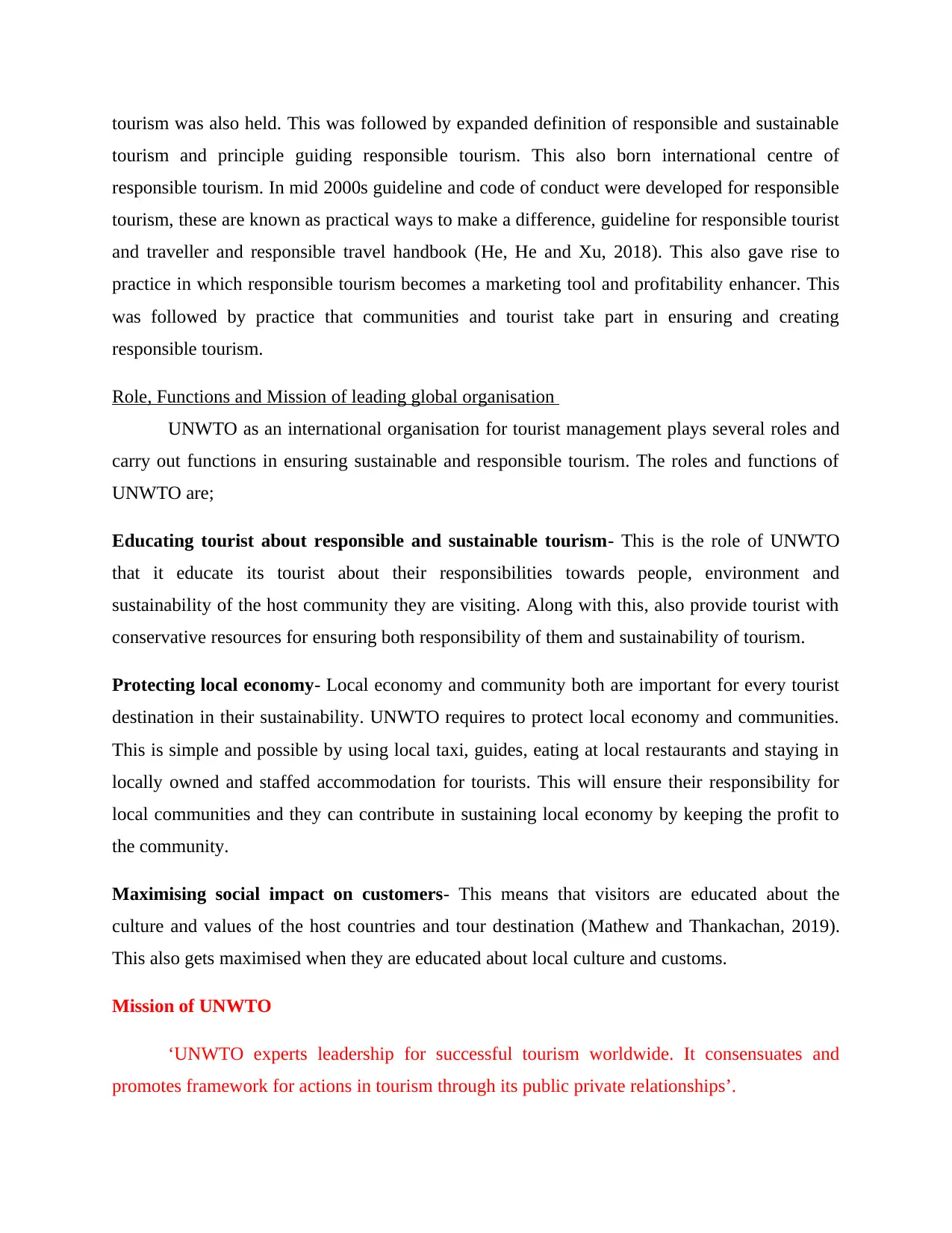
tourism was also held. This was followed by expanded definition of responsible and sustainable
tourism and principle guiding responsible tourism. This also born international centre of
responsible tourism. In mid 2000s guideline and code of conduct were developed for responsible
tourism, these are known as practical ways to make a difference, guideline for responsible tourist
and traveller and responsible travel handbook (He, He and Xu, 2018). This also gave rise to
practice in which responsible tourism becomes a marketing tool and profitability enhancer. This
was followed by practice that communities and tourist take part in ensuring and creating
responsible tourism.
Role, Functions and Mission of leading global organisation
UNWTO as an international organisation for tourist management plays several roles and
carry out functions in ensuring sustainable and responsible tourism. The roles and functions of
UNWTO are;
Educating tourist about responsible and sustainable tourism- This is the role of UNWTO
that it educate its tourist about their responsibilities towards people, environment and
sustainability of the host community they are visiting. Along with this, also provide tourist with
conservative resources for ensuring both responsibility of them and sustainability of tourism.
Protecting local economy- Local economy and community both are important for every tourist
destination in their sustainability. UNWTO requires to protect local economy and communities.
This is simple and possible by using local taxi, guides, eating at local restaurants and staying in
locally owned and staffed accommodation for tourists. This will ensure their responsibility for
local communities and they can contribute in sustaining local economy by keeping the profit to
the community.
Maximising social impact on customers- This means that visitors are educated about the
culture and values of the host countries and tour destination (Mathew and Thankachan, 2019).
This also gets maximised when they are educated about local culture and customs.
Mission of UNWTO
‘UNWTO experts leadership for successful tourism worldwide. It consensuates and
promotes framework for actions in tourism through its public private relationships’.
tourism and principle guiding responsible tourism. This also born international centre of
responsible tourism. In mid 2000s guideline and code of conduct were developed for responsible
tourism, these are known as practical ways to make a difference, guideline for responsible tourist
and traveller and responsible travel handbook (He, He and Xu, 2018). This also gave rise to
practice in which responsible tourism becomes a marketing tool and profitability enhancer. This
was followed by practice that communities and tourist take part in ensuring and creating
responsible tourism.
Role, Functions and Mission of leading global organisation
UNWTO as an international organisation for tourist management plays several roles and
carry out functions in ensuring sustainable and responsible tourism. The roles and functions of
UNWTO are;
Educating tourist about responsible and sustainable tourism- This is the role of UNWTO
that it educate its tourist about their responsibilities towards people, environment and
sustainability of the host community they are visiting. Along with this, also provide tourist with
conservative resources for ensuring both responsibility of them and sustainability of tourism.
Protecting local economy- Local economy and community both are important for every tourist
destination in their sustainability. UNWTO requires to protect local economy and communities.
This is simple and possible by using local taxi, guides, eating at local restaurants and staying in
locally owned and staffed accommodation for tourists. This will ensure their responsibility for
local communities and they can contribute in sustaining local economy by keeping the profit to
the community.
Maximising social impact on customers- This means that visitors are educated about the
culture and values of the host countries and tour destination (Mathew and Thankachan, 2019).
This also gets maximised when they are educated about local culture and customs.
Mission of UNWTO
‘UNWTO experts leadership for successful tourism worldwide. It consensuates and
promotes framework for actions in tourism through its public private relationships’.
Paraphrase This Document
Need a fresh take? Get an instant paraphrase of this document with our AI Paraphraser
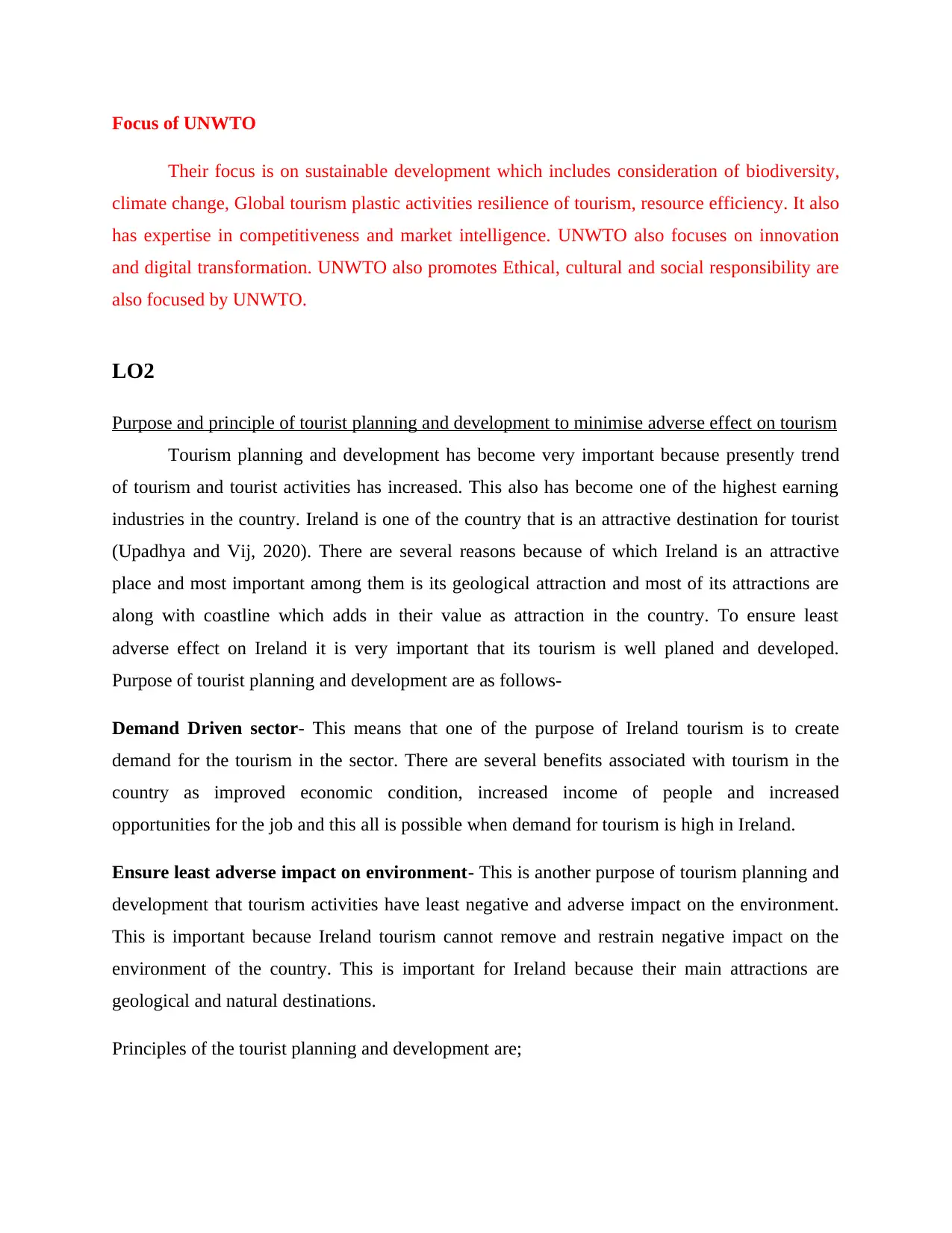
Focus of UNWTO
Their focus is on sustainable development which includes consideration of biodiversity,
climate change, Global tourism plastic activities resilience of tourism, resource efficiency. It also
has expertise in competitiveness and market intelligence. UNWTO also focuses on innovation
and digital transformation. UNWTO also promotes Ethical, cultural and social responsibility are
also focused by UNWTO.
LO2
Purpose and principle of tourist planning and development to minimise adverse effect on tourism
Tourism planning and development has become very important because presently trend
of tourism and tourist activities has increased. This also has become one of the highest earning
industries in the country. Ireland is one of the country that is an attractive destination for tourist
(Upadhya and Vij, 2020). There are several reasons because of which Ireland is an attractive
place and most important among them is its geological attraction and most of its attractions are
along with coastline which adds in their value as attraction in the country. To ensure least
adverse effect on Ireland it is very important that its tourism is well planed and developed.
Purpose of tourist planning and development are as follows-
Demand Driven sector- This means that one of the purpose of Ireland tourism is to create
demand for the tourism in the sector. There are several benefits associated with tourism in the
country as improved economic condition, increased income of people and increased
opportunities for the job and this all is possible when demand for tourism is high in Ireland.
Ensure least adverse impact on environment- This is another purpose of tourism planning and
development that tourism activities have least negative and adverse impact on the environment.
This is important because Ireland tourism cannot remove and restrain negative impact on the
environment of the country. This is important for Ireland because their main attractions are
geological and natural destinations.
Principles of the tourist planning and development are;
Their focus is on sustainable development which includes consideration of biodiversity,
climate change, Global tourism plastic activities resilience of tourism, resource efficiency. It also
has expertise in competitiveness and market intelligence. UNWTO also focuses on innovation
and digital transformation. UNWTO also promotes Ethical, cultural and social responsibility are
also focused by UNWTO.
LO2
Purpose and principle of tourist planning and development to minimise adverse effect on tourism
Tourism planning and development has become very important because presently trend
of tourism and tourist activities has increased. This also has become one of the highest earning
industries in the country. Ireland is one of the country that is an attractive destination for tourist
(Upadhya and Vij, 2020). There are several reasons because of which Ireland is an attractive
place and most important among them is its geological attraction and most of its attractions are
along with coastline which adds in their value as attraction in the country. To ensure least
adverse effect on Ireland it is very important that its tourism is well planed and developed.
Purpose of tourist planning and development are as follows-
Demand Driven sector- This means that one of the purpose of Ireland tourism is to create
demand for the tourism in the sector. There are several benefits associated with tourism in the
country as improved economic condition, increased income of people and increased
opportunities for the job and this all is possible when demand for tourism is high in Ireland.
Ensure least adverse impact on environment- This is another purpose of tourism planning and
development that tourism activities have least negative and adverse impact on the environment.
This is important because Ireland tourism cannot remove and restrain negative impact on the
environment of the country. This is important for Ireland because their main attractions are
geological and natural destinations.
Principles of the tourist planning and development are;
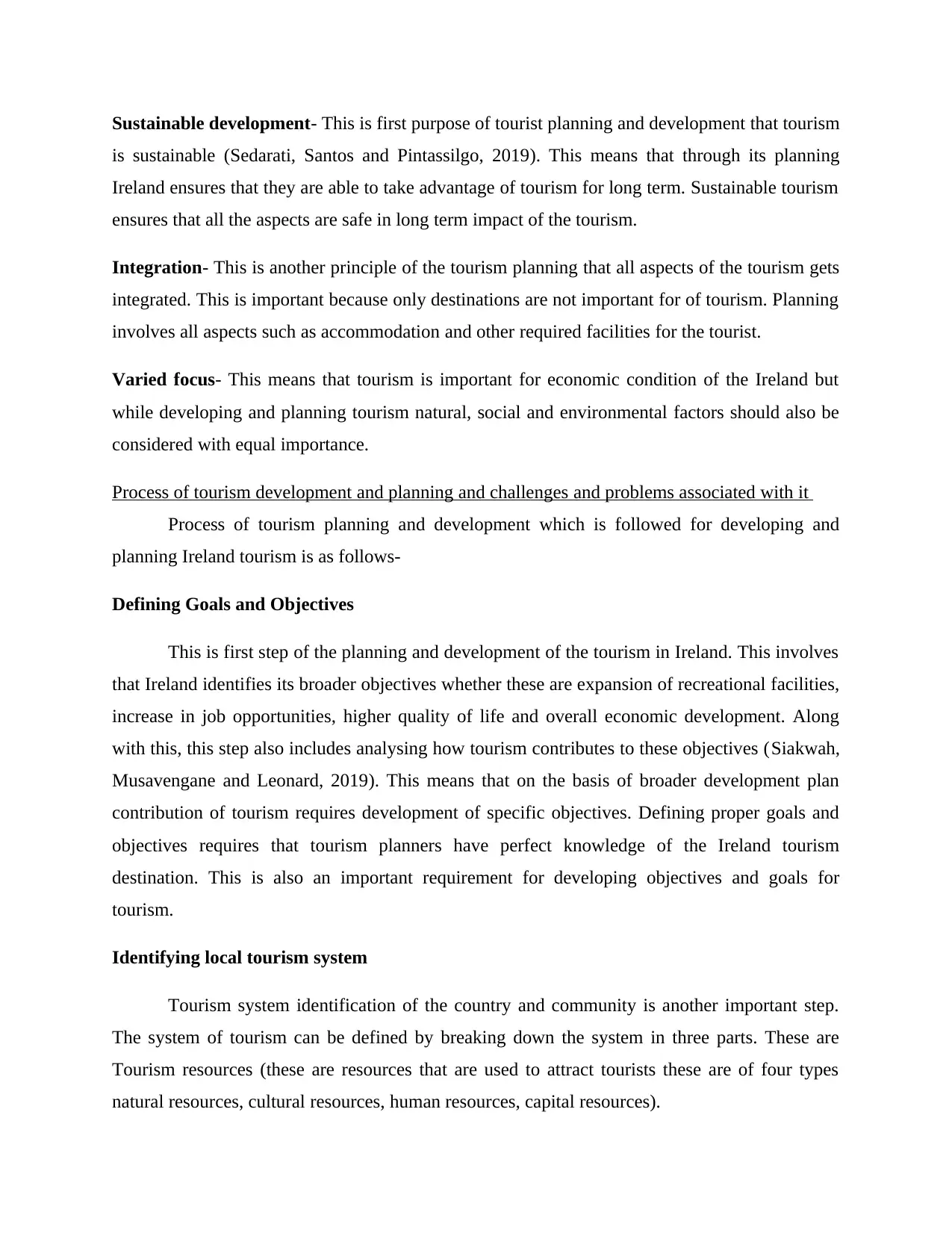
Sustainable development- This is first purpose of tourist planning and development that tourism
is sustainable (Sedarati, Santos and Pintassilgo, 2019). This means that through its planning
Ireland ensures that they are able to take advantage of tourism for long term. Sustainable tourism
ensures that all the aspects are safe in long term impact of the tourism.
Integration- This is another principle of the tourism planning that all aspects of the tourism gets
integrated. This is important because only destinations are not important for of tourism. Planning
involves all aspects such as accommodation and other required facilities for the tourist.
Varied focus- This means that tourism is important for economic condition of the Ireland but
while developing and planning tourism natural, social and environmental factors should also be
considered with equal importance.
Process of tourism development and planning and challenges and problems associated with it
Process of tourism planning and development which is followed for developing and
planning Ireland tourism is as follows-
Defining Goals and Objectives
This is first step of the planning and development of the tourism in Ireland. This involves
that Ireland identifies its broader objectives whether these are expansion of recreational facilities,
increase in job opportunities, higher quality of life and overall economic development. Along
with this, this step also includes analysing how tourism contributes to these objectives (Siakwah,
Musavengane and Leonard, 2019). This means that on the basis of broader development plan
contribution of tourism requires development of specific objectives. Defining proper goals and
objectives requires that tourism planners have perfect knowledge of the Ireland tourism
destination. This is also an important requirement for developing objectives and goals for
tourism.
Identifying local tourism system
Tourism system identification of the country and community is another important step.
The system of tourism can be defined by breaking down the system in three parts. These are
Tourism resources (these are resources that are used to attract tourists these are of four types
natural resources, cultural resources, human resources, capital resources).
is sustainable (Sedarati, Santos and Pintassilgo, 2019). This means that through its planning
Ireland ensures that they are able to take advantage of tourism for long term. Sustainable tourism
ensures that all the aspects are safe in long term impact of the tourism.
Integration- This is another principle of the tourism planning that all aspects of the tourism gets
integrated. This is important because only destinations are not important for of tourism. Planning
involves all aspects such as accommodation and other required facilities for the tourist.
Varied focus- This means that tourism is important for economic condition of the Ireland but
while developing and planning tourism natural, social and environmental factors should also be
considered with equal importance.
Process of tourism development and planning and challenges and problems associated with it
Process of tourism planning and development which is followed for developing and
planning Ireland tourism is as follows-
Defining Goals and Objectives
This is first step of the planning and development of the tourism in Ireland. This involves
that Ireland identifies its broader objectives whether these are expansion of recreational facilities,
increase in job opportunities, higher quality of life and overall economic development. Along
with this, this step also includes analysing how tourism contributes to these objectives (Siakwah,
Musavengane and Leonard, 2019). This means that on the basis of broader development plan
contribution of tourism requires development of specific objectives. Defining proper goals and
objectives requires that tourism planners have perfect knowledge of the Ireland tourism
destination. This is also an important requirement for developing objectives and goals for
tourism.
Identifying local tourism system
Tourism system identification of the country and community is another important step.
The system of tourism can be defined by breaking down the system in three parts. These are
Tourism resources (these are resources that are used to attract tourists these are of four types
natural resources, cultural resources, human resources, capital resources).
⊘ This is a preview!⊘
Do you want full access?
Subscribe today to unlock all pages.

Trusted by 1+ million students worldwide
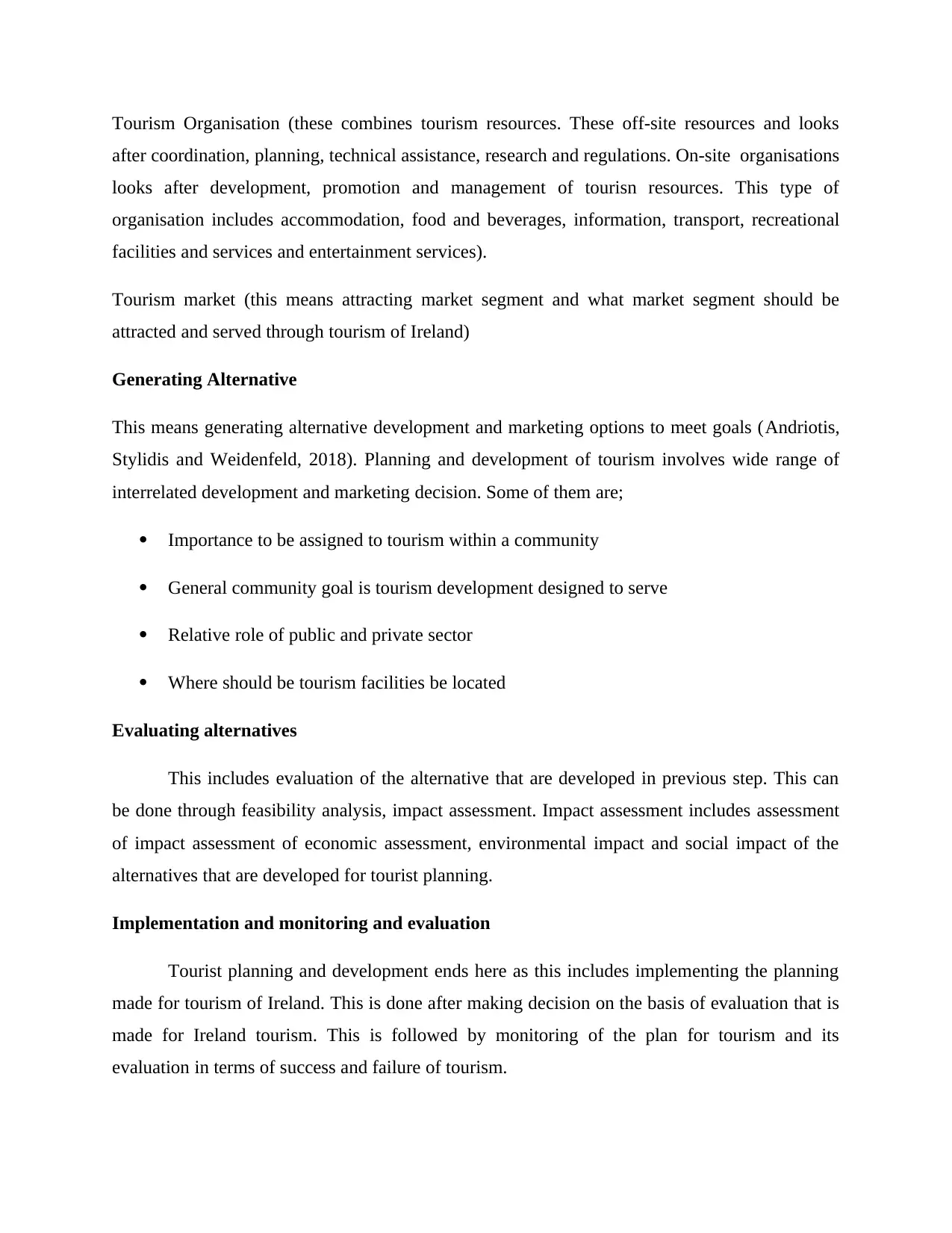
Tourism Organisation (these combines tourism resources. These off-site resources and looks
after coordination, planning, technical assistance, research and regulations. On-site organisations
looks after development, promotion and management of tourisn resources. This type of
organisation includes accommodation, food and beverages, information, transport, recreational
facilities and services and entertainment services).
Tourism market (this means attracting market segment and what market segment should be
attracted and served through tourism of Ireland)
Generating Alternative
This means generating alternative development and marketing options to meet goals (Andriotis,
Stylidis and Weidenfeld, 2018). Planning and development of tourism involves wide range of
interrelated development and marketing decision. Some of them are;
Importance to be assigned to tourism within a community
General community goal is tourism development designed to serve
Relative role of public and private sector
Where should be tourism facilities be located
Evaluating alternatives
This includes evaluation of the alternative that are developed in previous step. This can
be done through feasibility analysis, impact assessment. Impact assessment includes assessment
of impact assessment of economic assessment, environmental impact and social impact of the
alternatives that are developed for tourist planning.
Implementation and monitoring and evaluation
Tourist planning and development ends here as this includes implementing the planning
made for tourism of Ireland. This is done after making decision on the basis of evaluation that is
made for Ireland tourism. This is followed by monitoring of the plan for tourism and its
evaluation in terms of success and failure of tourism.
after coordination, planning, technical assistance, research and regulations. On-site organisations
looks after development, promotion and management of tourisn resources. This type of
organisation includes accommodation, food and beverages, information, transport, recreational
facilities and services and entertainment services).
Tourism market (this means attracting market segment and what market segment should be
attracted and served through tourism of Ireland)
Generating Alternative
This means generating alternative development and marketing options to meet goals (Andriotis,
Stylidis and Weidenfeld, 2018). Planning and development of tourism involves wide range of
interrelated development and marketing decision. Some of them are;
Importance to be assigned to tourism within a community
General community goal is tourism development designed to serve
Relative role of public and private sector
Where should be tourism facilities be located
Evaluating alternatives
This includes evaluation of the alternative that are developed in previous step. This can
be done through feasibility analysis, impact assessment. Impact assessment includes assessment
of impact assessment of economic assessment, environmental impact and social impact of the
alternatives that are developed for tourist planning.
Implementation and monitoring and evaluation
Tourist planning and development ends here as this includes implementing the planning
made for tourism of Ireland. This is done after making decision on the basis of evaluation that is
made for Ireland tourism. This is followed by monitoring of the plan for tourism and its
evaluation in terms of success and failure of tourism.
Paraphrase This Document
Need a fresh take? Get an instant paraphrase of this document with our AI Paraphraser
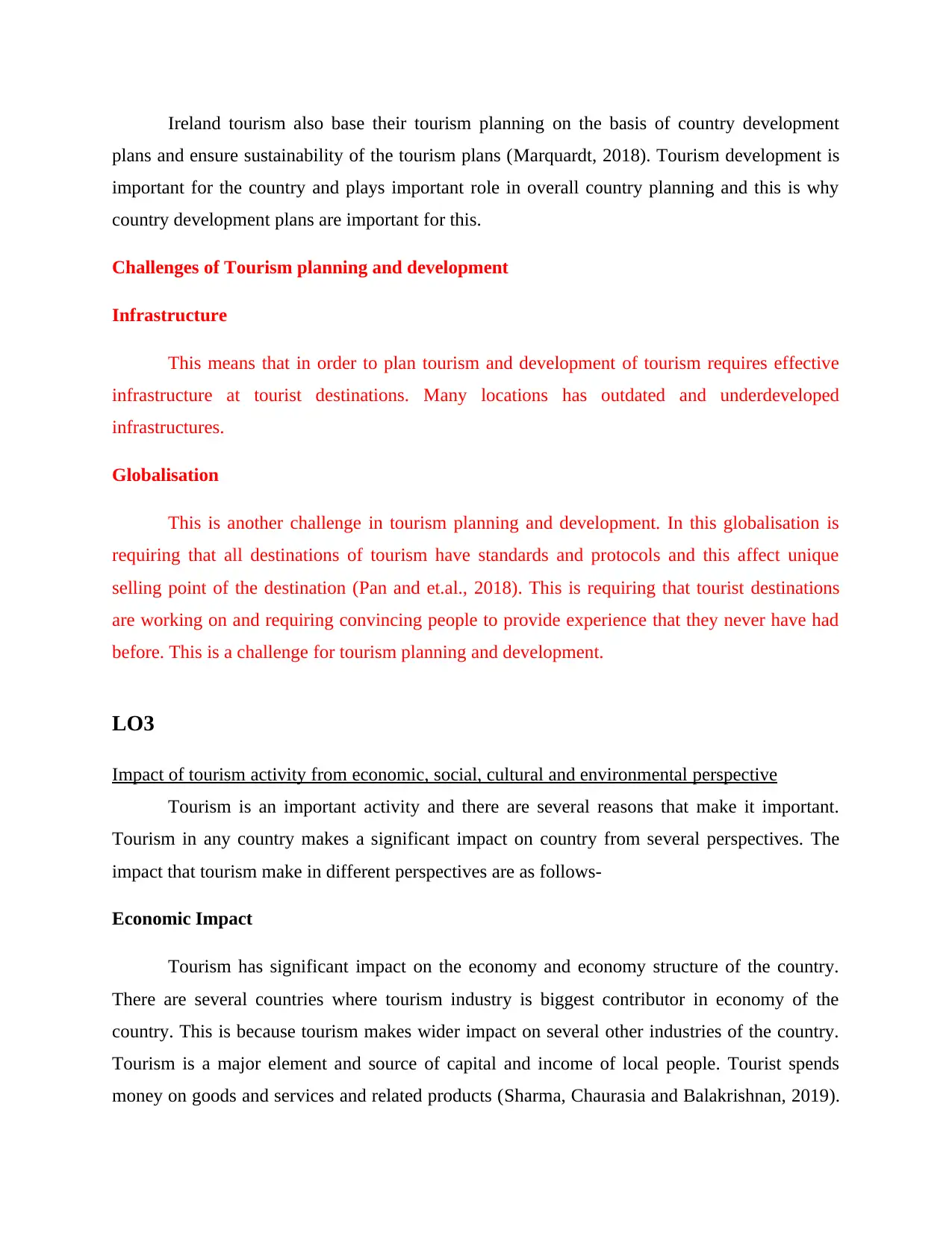
Ireland tourism also base their tourism planning on the basis of country development
plans and ensure sustainability of the tourism plans (Marquardt, 2018). Tourism development is
important for the country and plays important role in overall country planning and this is why
country development plans are important for this.
Challenges of Tourism planning and development
Infrastructure
This means that in order to plan tourism and development of tourism requires effective
infrastructure at tourist destinations. Many locations has outdated and underdeveloped
infrastructures.
Globalisation
This is another challenge in tourism planning and development. In this globalisation is
requiring that all destinations of tourism have standards and protocols and this affect unique
selling point of the destination (Pan and et.al., 2018). This is requiring that tourist destinations
are working on and requiring convincing people to provide experience that they never have had
before. This is a challenge for tourism planning and development.
LO3
Impact of tourism activity from economic, social, cultural and environmental perspective
Tourism is an important activity and there are several reasons that make it important.
Tourism in any country makes a significant impact on country from several perspectives. The
impact that tourism make in different perspectives are as follows-
Economic Impact
Tourism has significant impact on the economy and economy structure of the country.
There are several countries where tourism industry is biggest contributor in economy of the
country. This is because tourism makes wider impact on several other industries of the country.
Tourism is a major element and source of capital and income of local people. Tourist spends
money on goods and services and related products (Sharma, Chaurasia and Balakrishnan, 2019).
plans and ensure sustainability of the tourism plans (Marquardt, 2018). Tourism development is
important for the country and plays important role in overall country planning and this is why
country development plans are important for this.
Challenges of Tourism planning and development
Infrastructure
This means that in order to plan tourism and development of tourism requires effective
infrastructure at tourist destinations. Many locations has outdated and underdeveloped
infrastructures.
Globalisation
This is another challenge in tourism planning and development. In this globalisation is
requiring that all destinations of tourism have standards and protocols and this affect unique
selling point of the destination (Pan and et.al., 2018). This is requiring that tourist destinations
are working on and requiring convincing people to provide experience that they never have had
before. This is a challenge for tourism planning and development.
LO3
Impact of tourism activity from economic, social, cultural and environmental perspective
Tourism is an important activity and there are several reasons that make it important.
Tourism in any country makes a significant impact on country from several perspectives. The
impact that tourism make in different perspectives are as follows-
Economic Impact
Tourism has significant impact on the economy and economy structure of the country.
There are several countries where tourism industry is biggest contributor in economy of the
country. This is because tourism makes wider impact on several other industries of the country.
Tourism is a major element and source of capital and income of local people. Tourist spends
money on goods and services and related products (Sharma, Chaurasia and Balakrishnan, 2019).
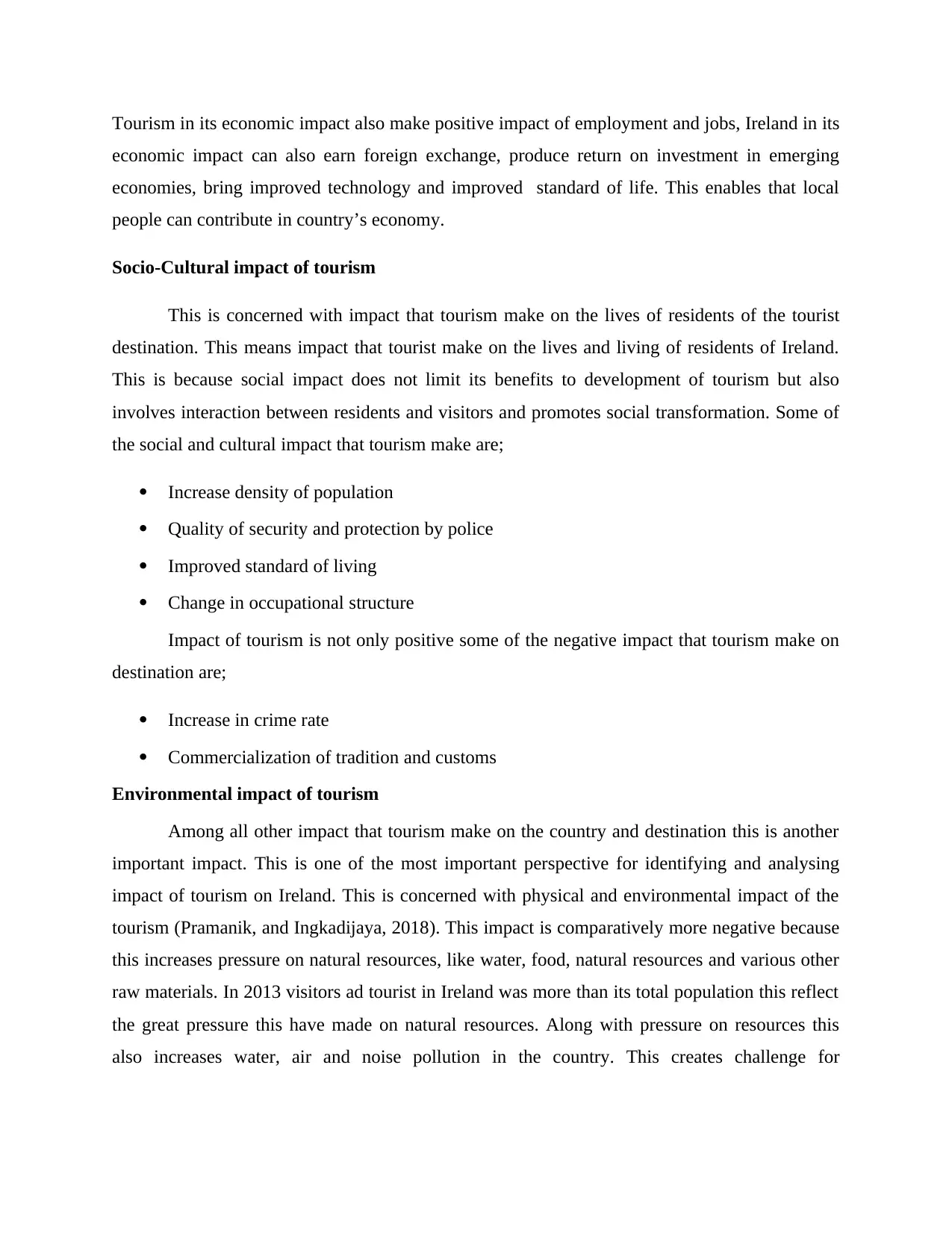
Tourism in its economic impact also make positive impact of employment and jobs, Ireland in its
economic impact can also earn foreign exchange, produce return on investment in emerging
economies, bring improved technology and improved standard of life. This enables that local
people can contribute in country’s economy.
Socio-Cultural impact of tourism
This is concerned with impact that tourism make on the lives of residents of the tourist
destination. This means impact that tourist make on the lives and living of residents of Ireland.
This is because social impact does not limit its benefits to development of tourism but also
involves interaction between residents and visitors and promotes social transformation. Some of
the social and cultural impact that tourism make are;
Increase density of population
Quality of security and protection by police
Improved standard of living
Change in occupational structure
Impact of tourism is not only positive some of the negative impact that tourism make on
destination are;
Increase in crime rate
Commercialization of tradition and customs
Environmental impact of tourism
Among all other impact that tourism make on the country and destination this is another
important impact. This is one of the most important perspective for identifying and analysing
impact of tourism on Ireland. This is concerned with physical and environmental impact of the
tourism (Pramanik, and Ingkadijaya, 2018). This impact is comparatively more negative because
this increases pressure on natural resources, like water, food, natural resources and various other
raw materials. In 2013 visitors ad tourist in Ireland was more than its total population this reflect
the great pressure this have made on natural resources. Along with pressure on resources this
also increases water, air and noise pollution in the country. This creates challenge for
economic impact can also earn foreign exchange, produce return on investment in emerging
economies, bring improved technology and improved standard of life. This enables that local
people can contribute in country’s economy.
Socio-Cultural impact of tourism
This is concerned with impact that tourism make on the lives of residents of the tourist
destination. This means impact that tourist make on the lives and living of residents of Ireland.
This is because social impact does not limit its benefits to development of tourism but also
involves interaction between residents and visitors and promotes social transformation. Some of
the social and cultural impact that tourism make are;
Increase density of population
Quality of security and protection by police
Improved standard of living
Change in occupational structure
Impact of tourism is not only positive some of the negative impact that tourism make on
destination are;
Increase in crime rate
Commercialization of tradition and customs
Environmental impact of tourism
Among all other impact that tourism make on the country and destination this is another
important impact. This is one of the most important perspective for identifying and analysing
impact of tourism on Ireland. This is concerned with physical and environmental impact of the
tourism (Pramanik, and Ingkadijaya, 2018). This impact is comparatively more negative because
this increases pressure on natural resources, like water, food, natural resources and various other
raw materials. In 2013 visitors ad tourist in Ireland was more than its total population this reflect
the great pressure this have made on natural resources. Along with pressure on resources this
also increases water, air and noise pollution in the country. This creates challenge for
⊘ This is a preview!⊘
Do you want full access?
Subscribe today to unlock all pages.

Trusted by 1+ million students worldwide
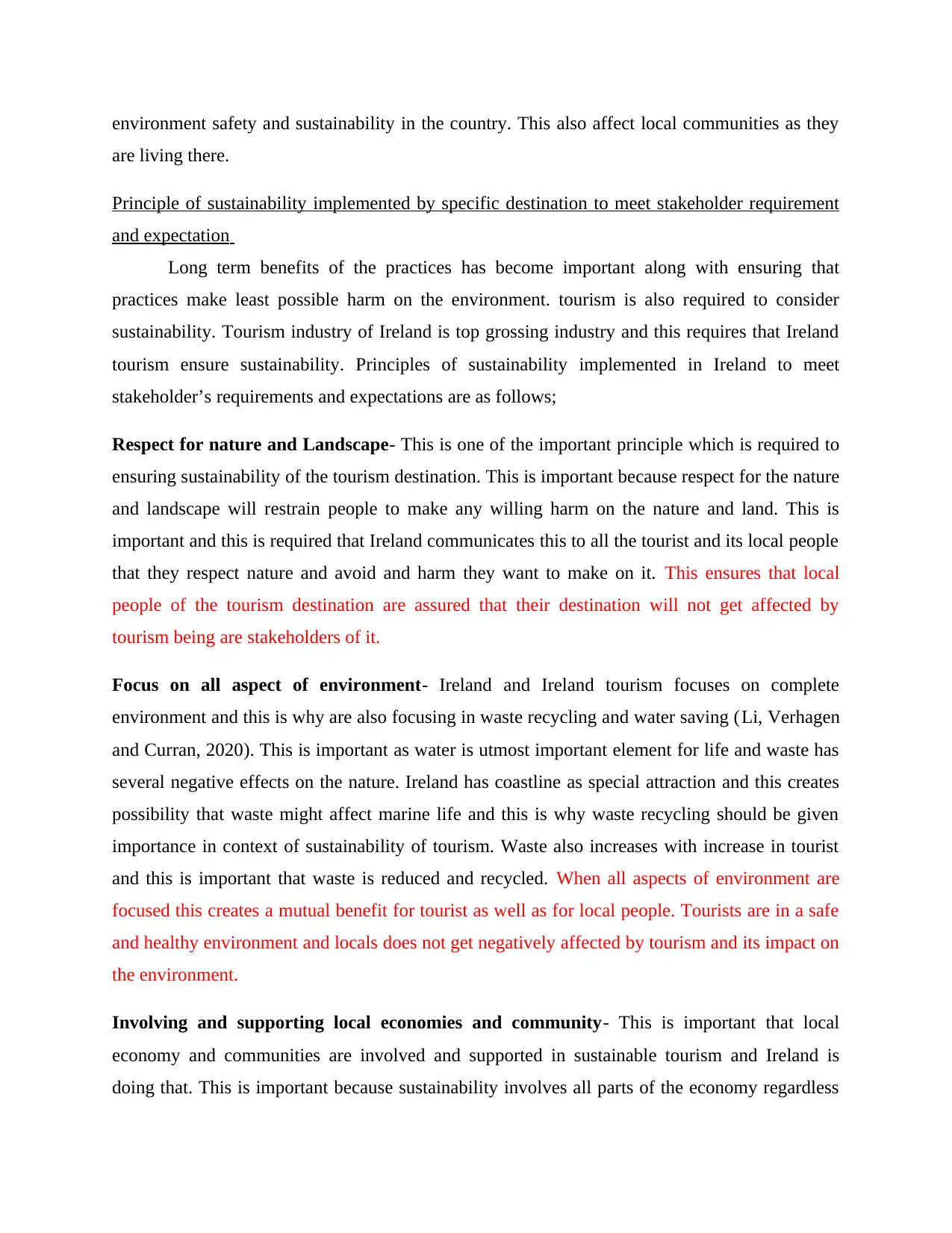
environment safety and sustainability in the country. This also affect local communities as they
are living there.
Principle of sustainability implemented by specific destination to meet stakeholder requirement
and expectation
Long term benefits of the practices has become important along with ensuring that
practices make least possible harm on the environment. tourism is also required to consider
sustainability. Tourism industry of Ireland is top grossing industry and this requires that Ireland
tourism ensure sustainability. Principles of sustainability implemented in Ireland to meet
stakeholder’s requirements and expectations are as follows;
Respect for nature and Landscape- This is one of the important principle which is required to
ensuring sustainability of the tourism destination. This is important because respect for the nature
and landscape will restrain people to make any willing harm on the nature and land. This is
important and this is required that Ireland communicates this to all the tourist and its local people
that they respect nature and avoid and harm they want to make on it. This ensures that local
people of the tourism destination are assured that their destination will not get affected by
tourism being are stakeholders of it.
Focus on all aspect of environment- Ireland and Ireland tourism focuses on complete
environment and this is why are also focusing in waste recycling and water saving (Li, Verhagen
and Curran, 2020). This is important as water is utmost important element for life and waste has
several negative effects on the nature. Ireland has coastline as special attraction and this creates
possibility that waste might affect marine life and this is why waste recycling should be given
importance in context of sustainability of tourism. Waste also increases with increase in tourist
and this is important that waste is reduced and recycled. When all aspects of environment are
focused this creates a mutual benefit for tourist as well as for local people. Tourists are in a safe
and healthy environment and locals does not get negatively affected by tourism and its impact on
the environment.
Involving and supporting local economies and community- This is important that local
economy and communities are involved and supported in sustainable tourism and Ireland is
doing that. This is important because sustainability involves all parts of the economy regardless
are living there.
Principle of sustainability implemented by specific destination to meet stakeholder requirement
and expectation
Long term benefits of the practices has become important along with ensuring that
practices make least possible harm on the environment. tourism is also required to consider
sustainability. Tourism industry of Ireland is top grossing industry and this requires that Ireland
tourism ensure sustainability. Principles of sustainability implemented in Ireland to meet
stakeholder’s requirements and expectations are as follows;
Respect for nature and Landscape- This is one of the important principle which is required to
ensuring sustainability of the tourism destination. This is important because respect for the nature
and landscape will restrain people to make any willing harm on the nature and land. This is
important and this is required that Ireland communicates this to all the tourist and its local people
that they respect nature and avoid and harm they want to make on it. This ensures that local
people of the tourism destination are assured that their destination will not get affected by
tourism being are stakeholders of it.
Focus on all aspect of environment- Ireland and Ireland tourism focuses on complete
environment and this is why are also focusing in waste recycling and water saving (Li, Verhagen
and Curran, 2020). This is important as water is utmost important element for life and waste has
several negative effects on the nature. Ireland has coastline as special attraction and this creates
possibility that waste might affect marine life and this is why waste recycling should be given
importance in context of sustainability of tourism. Waste also increases with increase in tourist
and this is important that waste is reduced and recycled. When all aspects of environment are
focused this creates a mutual benefit for tourist as well as for local people. Tourists are in a safe
and healthy environment and locals does not get negatively affected by tourism and its impact on
the environment.
Involving and supporting local economies and community- This is important that local
economy and communities are involved and supported in sustainable tourism and Ireland is
doing that. This is important because sustainability involves all parts of the economy regardless
Paraphrase This Document
Need a fresh take? Get an instant paraphrase of this document with our AI Paraphraser
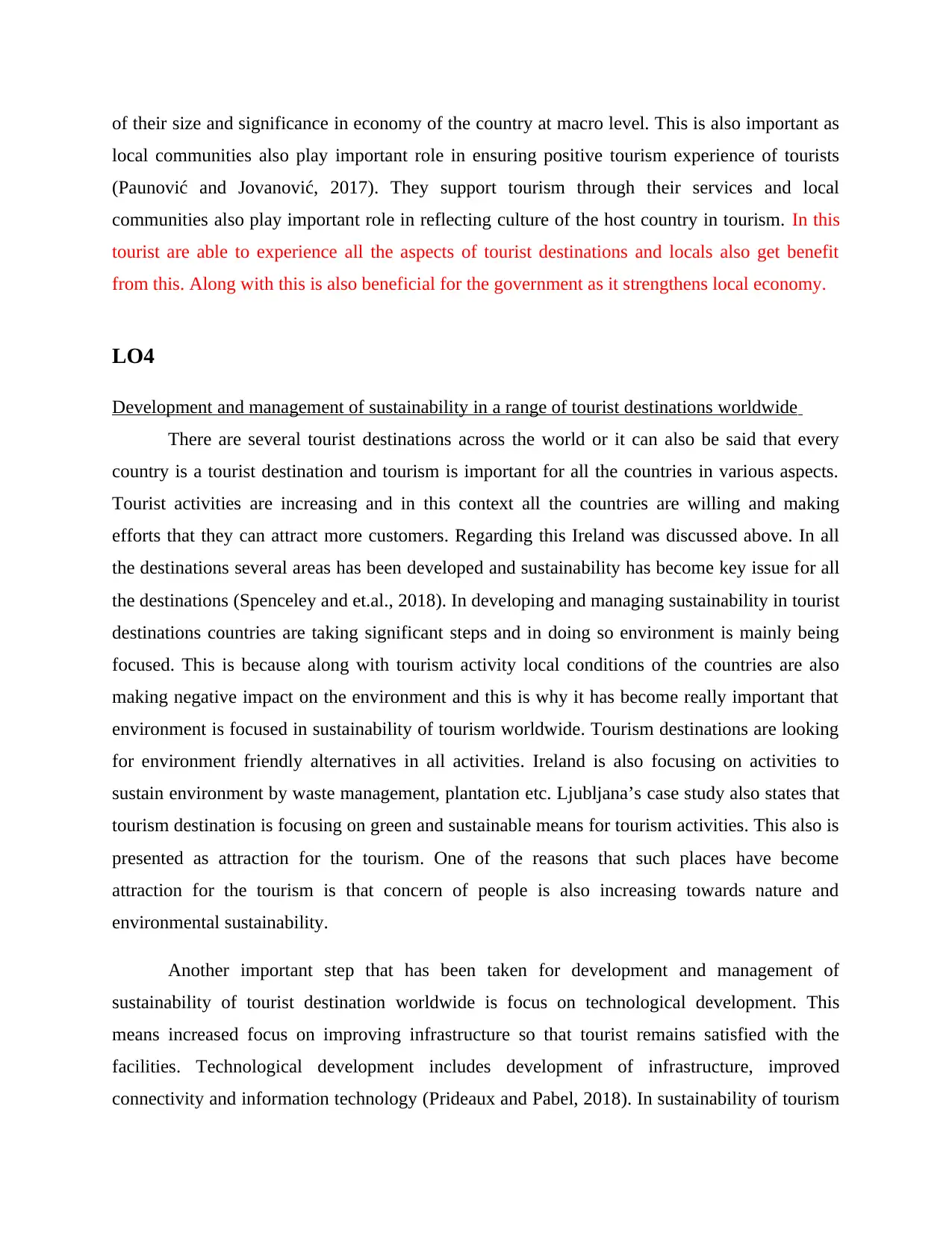
of their size and significance in economy of the country at macro level. This is also important as
local communities also play important role in ensuring positive tourism experience of tourists
(Paunović and Jovanović, 2017). They support tourism through their services and local
communities also play important role in reflecting culture of the host country in tourism. In this
tourist are able to experience all the aspects of tourist destinations and locals also get benefit
from this. Along with this is also beneficial for the government as it strengthens local economy.
LO4
Development and management of sustainability in a range of tourist destinations worldwide
There are several tourist destinations across the world or it can also be said that every
country is a tourist destination and tourism is important for all the countries in various aspects.
Tourist activities are increasing and in this context all the countries are willing and making
efforts that they can attract more customers. Regarding this Ireland was discussed above. In all
the destinations several areas has been developed and sustainability has become key issue for all
the destinations (Spenceley and et.al., 2018). In developing and managing sustainability in tourist
destinations countries are taking significant steps and in doing so environment is mainly being
focused. This is because along with tourism activity local conditions of the countries are also
making negative impact on the environment and this is why it has become really important that
environment is focused in sustainability of tourism worldwide. Tourism destinations are looking
for environment friendly alternatives in all activities. Ireland is also focusing on activities to
sustain environment by waste management, plantation etc. Ljubljana’s case study also states that
tourism destination is focusing on green and sustainable means for tourism activities. This also is
presented as attraction for the tourism. One of the reasons that such places have become
attraction for the tourism is that concern of people is also increasing towards nature and
environmental sustainability.
Another important step that has been taken for development and management of
sustainability of tourist destination worldwide is focus on technological development. This
means increased focus on improving infrastructure so that tourist remains satisfied with the
facilities. Technological development includes development of infrastructure, improved
connectivity and information technology (Prideaux and Pabel, 2018). In sustainability of tourism
local communities also play important role in ensuring positive tourism experience of tourists
(Paunović and Jovanović, 2017). They support tourism through their services and local
communities also play important role in reflecting culture of the host country in tourism. In this
tourist are able to experience all the aspects of tourist destinations and locals also get benefit
from this. Along with this is also beneficial for the government as it strengthens local economy.
LO4
Development and management of sustainability in a range of tourist destinations worldwide
There are several tourist destinations across the world or it can also be said that every
country is a tourist destination and tourism is important for all the countries in various aspects.
Tourist activities are increasing and in this context all the countries are willing and making
efforts that they can attract more customers. Regarding this Ireland was discussed above. In all
the destinations several areas has been developed and sustainability has become key issue for all
the destinations (Spenceley and et.al., 2018). In developing and managing sustainability in tourist
destinations countries are taking significant steps and in doing so environment is mainly being
focused. This is because along with tourism activity local conditions of the countries are also
making negative impact on the environment and this is why it has become really important that
environment is focused in sustainability of tourism worldwide. Tourism destinations are looking
for environment friendly alternatives in all activities. Ireland is also focusing on activities to
sustain environment by waste management, plantation etc. Ljubljana’s case study also states that
tourism destination is focusing on green and sustainable means for tourism activities. This also is
presented as attraction for the tourism. One of the reasons that such places have become
attraction for the tourism is that concern of people is also increasing towards nature and
environmental sustainability.
Another important step that has been taken for development and management of
sustainability of tourist destination worldwide is focus on technological development. This
means increased focus on improving infrastructure so that tourist remains satisfied with the
facilities. Technological development includes development of infrastructure, improved
connectivity and information technology (Prideaux and Pabel, 2018). In sustainability of tourism
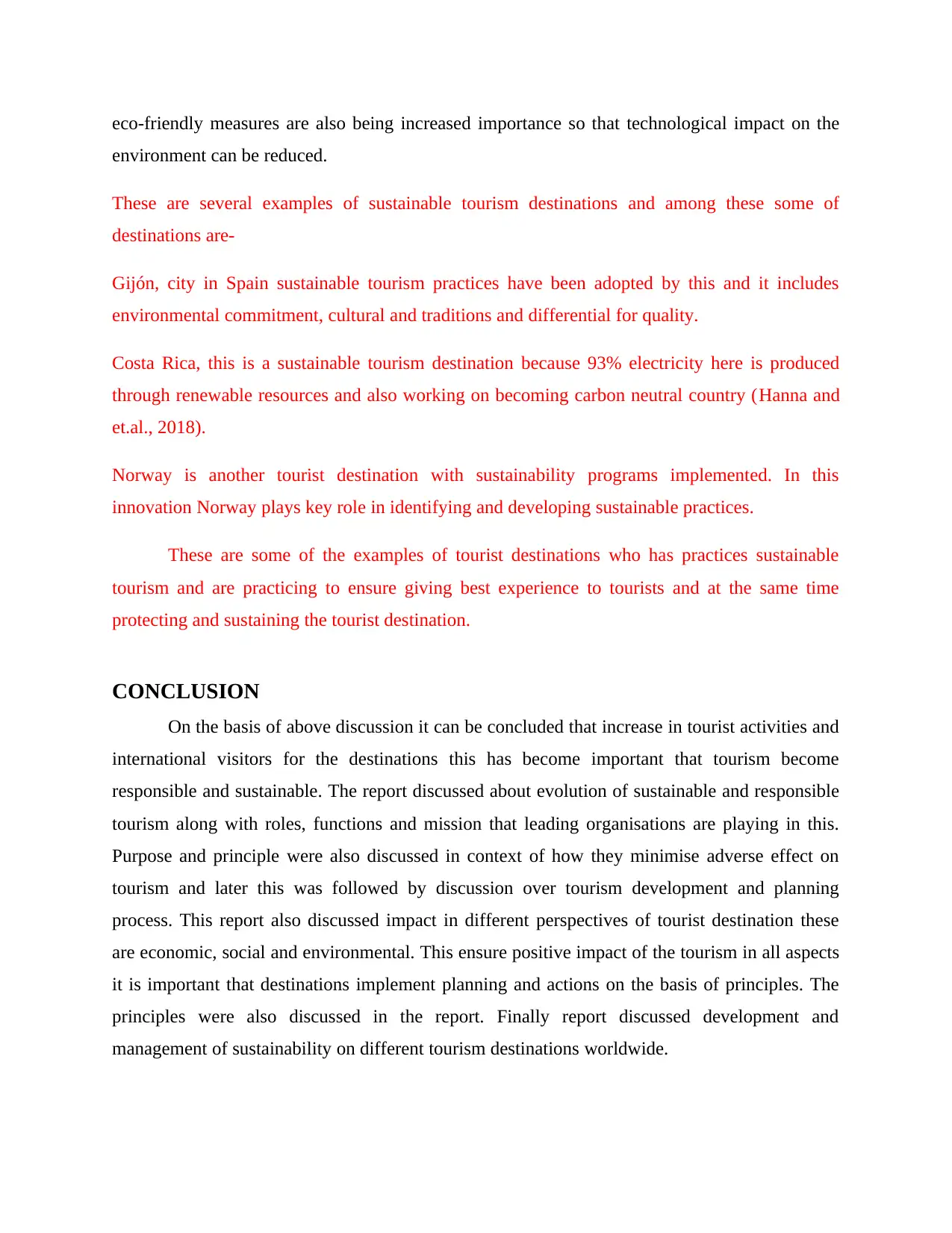
eco-friendly measures are also being increased importance so that technological impact on the
environment can be reduced.
These are several examples of sustainable tourism destinations and among these some of
destinations are-
Gijón, city in Spain sustainable tourism practices have been adopted by this and it includes
environmental commitment, cultural and traditions and differential for quality.
Costa Rica, this is a sustainable tourism destination because 93% electricity here is produced
through renewable resources and also working on becoming carbon neutral country (Hanna and
et.al., 2018).
Norway is another tourist destination with sustainability programs implemented. In this
innovation Norway plays key role in identifying and developing sustainable practices.
These are some of the examples of tourist destinations who has practices sustainable
tourism and are practicing to ensure giving best experience to tourists and at the same time
protecting and sustaining the tourist destination.
CONCLUSION
On the basis of above discussion it can be concluded that increase in tourist activities and
international visitors for the destinations this has become important that tourism become
responsible and sustainable. The report discussed about evolution of sustainable and responsible
tourism along with roles, functions and mission that leading organisations are playing in this.
Purpose and principle were also discussed in context of how they minimise adverse effect on
tourism and later this was followed by discussion over tourism development and planning
process. This report also discussed impact in different perspectives of tourist destination these
are economic, social and environmental. This ensure positive impact of the tourism in all aspects
it is important that destinations implement planning and actions on the basis of principles. The
principles were also discussed in the report. Finally report discussed development and
management of sustainability on different tourism destinations worldwide.
environment can be reduced.
These are several examples of sustainable tourism destinations and among these some of
destinations are-
Gijón, city in Spain sustainable tourism practices have been adopted by this and it includes
environmental commitment, cultural and traditions and differential for quality.
Costa Rica, this is a sustainable tourism destination because 93% electricity here is produced
through renewable resources and also working on becoming carbon neutral country (Hanna and
et.al., 2018).
Norway is another tourist destination with sustainability programs implemented. In this
innovation Norway plays key role in identifying and developing sustainable practices.
These are some of the examples of tourist destinations who has practices sustainable
tourism and are practicing to ensure giving best experience to tourists and at the same time
protecting and sustaining the tourist destination.
CONCLUSION
On the basis of above discussion it can be concluded that increase in tourist activities and
international visitors for the destinations this has become important that tourism become
responsible and sustainable. The report discussed about evolution of sustainable and responsible
tourism along with roles, functions and mission that leading organisations are playing in this.
Purpose and principle were also discussed in context of how they minimise adverse effect on
tourism and later this was followed by discussion over tourism development and planning
process. This report also discussed impact in different perspectives of tourist destination these
are economic, social and environmental. This ensure positive impact of the tourism in all aspects
it is important that destinations implement planning and actions on the basis of principles. The
principles were also discussed in the report. Finally report discussed development and
management of sustainability on different tourism destinations worldwide.
⊘ This is a preview!⊘
Do you want full access?
Subscribe today to unlock all pages.

Trusted by 1+ million students worldwide
1 out of 14
Related Documents
Your All-in-One AI-Powered Toolkit for Academic Success.
+13062052269
info@desklib.com
Available 24*7 on WhatsApp / Email
![[object Object]](/_next/static/media/star-bottom.7253800d.svg)
Unlock your academic potential
Copyright © 2020–2026 A2Z Services. All Rights Reserved. Developed and managed by ZUCOL.





